Perceptions of Neurosurgery among Medical Students and Interns: A National Cross-Sectional Study
Abstract
1. Introduction
2. Methods and Study Design
2.1. Methodology
2.2. Data Analysis
3. Results
3.1. Demographic Information and Distribution of Respondents to Question Items
3.2. Factors Affecting Perceptions and Attitudes of Neurosurgery
4. Discussion
5. Conclusions
Supplementary Materials
Author Contributions
Funding
Institutional Review Board Statement
Informed Consent Statement
Data Availability Statement
Conflicts of Interest
References
- Hill, C.S.; Dias, L.; Kitchen, N. Perceptions of neurosurgery: A survey of medical students and foundation doctors. Br. J. Neurosurg. 2011, 25, 261–267. [Google Scholar] [CrossRef] [PubMed]
- Bland, K.I.; Isaacs, G. Contemporary trends in student selection of medical specialties: The potential impact on general surgery. Arch. Surg. 2002, 137, 259–267. [Google Scholar] [CrossRef]
- Akhigbe, T.; Sattar, M. Attitudes and perceptions of medical students toward neurosurgery. World Neurosurg. 2014, 81, 226–228. [Google Scholar] [CrossRef] [PubMed]
- Wilson, M.P.; Pugh, J.A. Increasing the appeal of neurosurgery to qualified medical students in Canada. Can. J. Neurol. Sci. 2012, 39, 667–669. [Google Scholar] [CrossRef]
- Agarwal, N.; Norrmén-Smith, I.O.; Tomei, K.L.; Prestigiacomo, C.J.; Gandhi, C.D. Improving medical student recruitment into neurological surgery: A single institution’s experience. World Neurosurg. 2013, 80, 745–750. [Google Scholar] [CrossRef] [PubMed]
- Lukas, R.V.; Cooper, B.; Morgan, I.; Brorson, J.R.; Dong, H.; Sherer, R. Attitudes toward neurosciences in medical students in Wuhan, China: A survey study. World Neurosurg. 2014, 82, 266–269. [Google Scholar] [CrossRef]
- Medical and Dental Recruitment Selection. Competition Ratios. Available online: https://specialtytraining.hee.nhs.uk/Competition-Ratios (accessed on 25 March 2018).
- Alenezi, F.; Albalawi, K.A.; Albalawi, M.F.; Alhejaili, M.A.; Alrashedi, M.H.; Alatawi, A.N. Assessment of Attitude and Perception toward Neurology and Neurosurgery Specialties among Medical Students and Interns Attending College of Medicine at University of Tabuk in Tabuk City, Saudi Arabia-2017. Egypt. J. Hosp. Med. 2018, 71, 2960–2962. [Google Scholar]
- AlQahtani, N.G.; Alhumaid, T.; Almazyad, K.; Almesned, I.; Almusalam, A.; Agha, S. Attitudes and Perceptions of Medical Students toward Neurosurgery as a Career, Riyadh, Saudi Arabia. Egypt. J. Hosp. Med. 2018, 73, 5935–5939. [Google Scholar] [CrossRef]
- Roy, B.; Banerjee, I.; Banerjee, I.; Sathian, B.; Baboo, N.S. Impact of gender, nationality and drawbacks in medical profession as a predictor of future career specialization among medical students. Med. Sci. 2013, 1, 3–11. [Google Scholar] [CrossRef][Green Version]
- Ali, A.; Tariq, A. Attitudes and Perceptions of Omani Medical Students and Interns Toward Neurosurgery: A Cross-Sectional Study. Am. J. Clin. Neurol. Neurosurg. 2018, 3, 5–11. [Google Scholar]
- Stumpo, V.; Latour, K.; Traylor, J.I.; Staartjes, V.E.; Giordano, M.; Caccavella, V.M.; Signorelli, F. Medical student interest and recruitment in neurosurgery. World Neurosurg. 2020, 141, 448–454. [Google Scholar] [CrossRef]
- Kearns, K.N.; Rabinovich, E.P.; Shabo, L.; Shaffrey, M.E.; Jane, J.A., Jr.; Park, M.S. Gender Equity of Promoting Practices in Academic Neurosurgery in the United States. World Neurosurg. 2022, 158, 139–147. [Google Scholar] [CrossRef] [PubMed]
- Abdulghani, H.M.; Al-Shaikh, G.; Alhujayri, A.K.; Alohaideb, N.S.; Alsaeed, H.A.; Alshohayeb, I.S.; Alyahya, M.M.; Alhaqwi, A.I.; Shaik, S.A. What determines the selection of undergraduate medical students to the specialty of their future careers? Med. Teach. 2013, 1 (Suppl. 1), S25–S30. [Google Scholar] [CrossRef]
- Alshahrani, M.; Dhafery, B.; Al Mulhim, M.; Alkhadra, F.; Al Bagshi, D.; Bukhamsin, N. Factors influencing Saudi medical students and interns’ choice of future specialty: A self-administered questionnaire. Adv. Med. Educ. Pract. 2014, 5, 397–402. [Google Scholar] [CrossRef]
- Richardson, J.D. Workforce and lifestyle issues in general surgery training and practice. Arch. Surg. 2002, 137, 515–520. [Google Scholar] [CrossRef]
- Gargiulo, D.A.; Hyman, N.H.; Hebert, J.C. Women in surgery: Do we really understand the deterrents? Arch. Surg. 2006, 141, 405–408. [Google Scholar] [CrossRef]
- Renfrow, J.J.; Rodriguez, A.; Liu, A.; Pilitsis, J.G.; Samadani, U.; Ganju, A.; Wolfe, S.Q. Positive trends in neurosurgery enrollment and attrition: Analysis of the 2000–2009 female neurosurgery resident cohort. J. Neurosurg. 2016, 124, 834–839. [Google Scholar] [CrossRef] [PubMed]
- Aslan, A.; Kuzucu, P.; Karaaslan, B.; Börcek, A.Ö. Women in neurosurgery: Gender differences in authorship in high-impact neurosurgery journals through the last two decades. World Neurosurg. 2020, 138, 374–380. [Google Scholar] [CrossRef]
- Benzil, D.L.; Abosch, A.; Germano, I.; Gilmer, H.; Maraire, J.N.; Muraszko, K.; Zusman, E. The future of neurosurgery: A white paper on the recruitment and retention of women in neurosurgery. J. Neurosurg. 2018, 109, 378–386. [Google Scholar]
- Bernardi, K.; Lyons, N.B.; Huang, L.; Holihan, J.L.; Olavarria, O.A.; Loor, M.M.; Liang, M.K. Gender disparity among surgical peer-reviewed literature. J. Surg. Res. 2020, 248, 117–122. [Google Scholar] [CrossRef]
- Habibi, Z.; Hadi, N.A.; Kim, E.E.; Alkhataybeh, R.A.; Sbeih, A.; Abou-Hamden, A.; Al Abdulsalam, H.K.; Al Shehhi, N.; Al-Azzani, R.; Garozzo, D.; et al. Progress in neurosurgery: Contributions of women neurosurgeons in the Middle East. J. Clin. Neurosci. 2021, 86, 337–346. [Google Scholar] [CrossRef] [PubMed]
- Mehmood, S.I.; Kumar, A.; Al-Binali, A.; Borleffs, J.C. Specialty preferences: Trends and perceptions among Saudi undergraduate medical students. Med. Teach. 2012, 1 (Suppl. 1), S51–S60. [Google Scholar] [CrossRef]
- Alsubaie, N.; Aldhofaian, H.S.; Alhuwaimel, L.; Ruxshan, N.; Alghamdi, F.; Shamia, A.; Abu-Zaid, A. Specialty preferences and the factors influencing them among pre-clerkship medical students: The first study from Alfaisal University-College of Medicine, Saudi Arabia. Cureus 2016, 23. [Google Scholar] [CrossRef] [PubMed]
- Dada, O.E.; Ooi, S.Z.Y.; Bukenya, G.W.; Kenfack, Y.J.; Le, C.; Ohonba, E.; Adeyemo, E.; Narain, K.; Awad, A.K.; Barrie, U.; et al. Evaluating the Impact of Neurosurgical Rotation Experience in Africa on the Interest and Perception of Medical Students Towards a Career in Neurosurgery: A Continental, Multi-Centre, Cross-Sectional Study. Front. Surg. 2022, 11, 198–201. [Google Scholar] [CrossRef]
- Efe, I.E.; Aliyeva, I.; Beyaztas, D.; Swiatek, V.M.; Esene, I.N.; Abdulrauf, S.I. Gender Differences in Perceptions and Attitudes of Medical Students Toward Neurosurgery: A German Nationwide Survey. World Neurosurg. 2022, 163, 96–103.e2. [Google Scholar] [CrossRef]
- Al-Qahtani, K.H.; Brousseau, V.J.; Fakhri, S.; Zeitouni, A.G.; Islam, T. Hearing outcome in the conservative management of vestibular schwannomas. Saudi J. Otorhinolaryngol. Head Neck Surg. 2014, 16, 31–35. [Google Scholar]
- Corrigan, M.A.; Shields, C.J.; Redmond, H.P. Factors influencing surgical career choices and advancement in Ireland and Britain. World J. Surg. 2007, 31, 1921–1929. [Google Scholar] [CrossRef]
- Zaed, I.; Jaaiddane, Y.; Chibbaro, S.; Tinterri, B. Burnout Among Neurosurgeons and Residents in Neurosurgery: A Systematic Review and Meta-Analysis of the Literature. World Neurosurg. 2020, 143, e529–e534. [Google Scholar] [CrossRef]
- Aldrees, T.; Hassouneh, B.; Alabdulkarim, A.; Asad, L.; Alqaryan, S.; Aljohani, E.; Alqahtani, K. Burnout among plastic surgery residents. National survey in Saudi Arabia. Saudi Med. J. 2017, 38, 832–836. [Google Scholar] [CrossRef][Green Version]
- Shaher Al-Otaibi, M.L.; Alyali, S.A.; Alshehri, T.K.; Alshehri, A.K.; Alshahrani, A.A.; Banah, A.G.; Bharti, R.K. Burnout syndrome among southern region orthopedic surgeons, Saudi Arabia. J. Family Med. Prim. Care 2020, 9, 2442–2447. [Google Scholar] [CrossRef]
- Al-Qahtani, Z.A.; Alhazzani, A. Prevalence of burnout among neurologists in Saudi Arabia. Egypt J. Neurol. Psychiatry Neurosurg. 2021, 57, 54. [Google Scholar] [CrossRef]
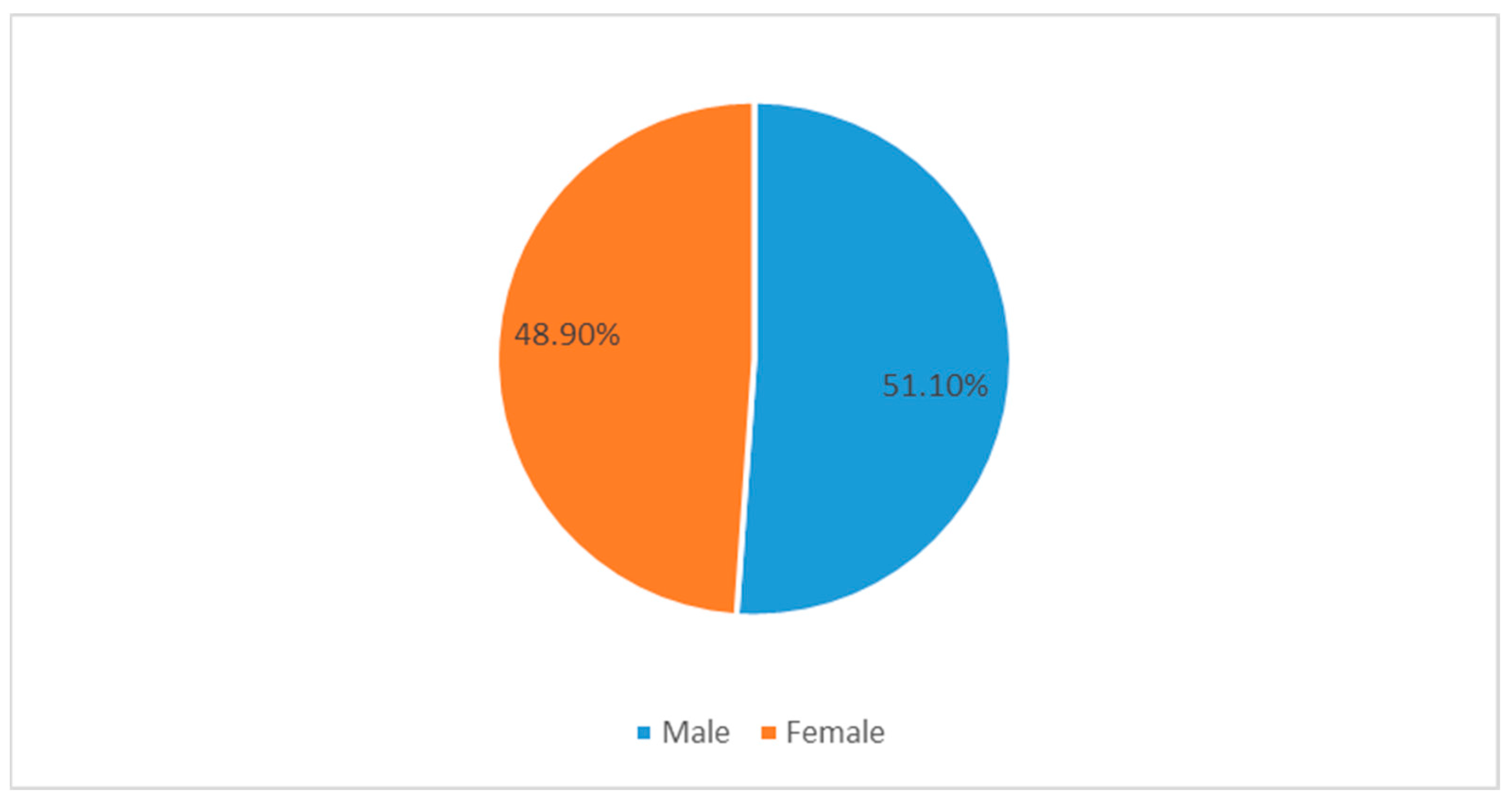
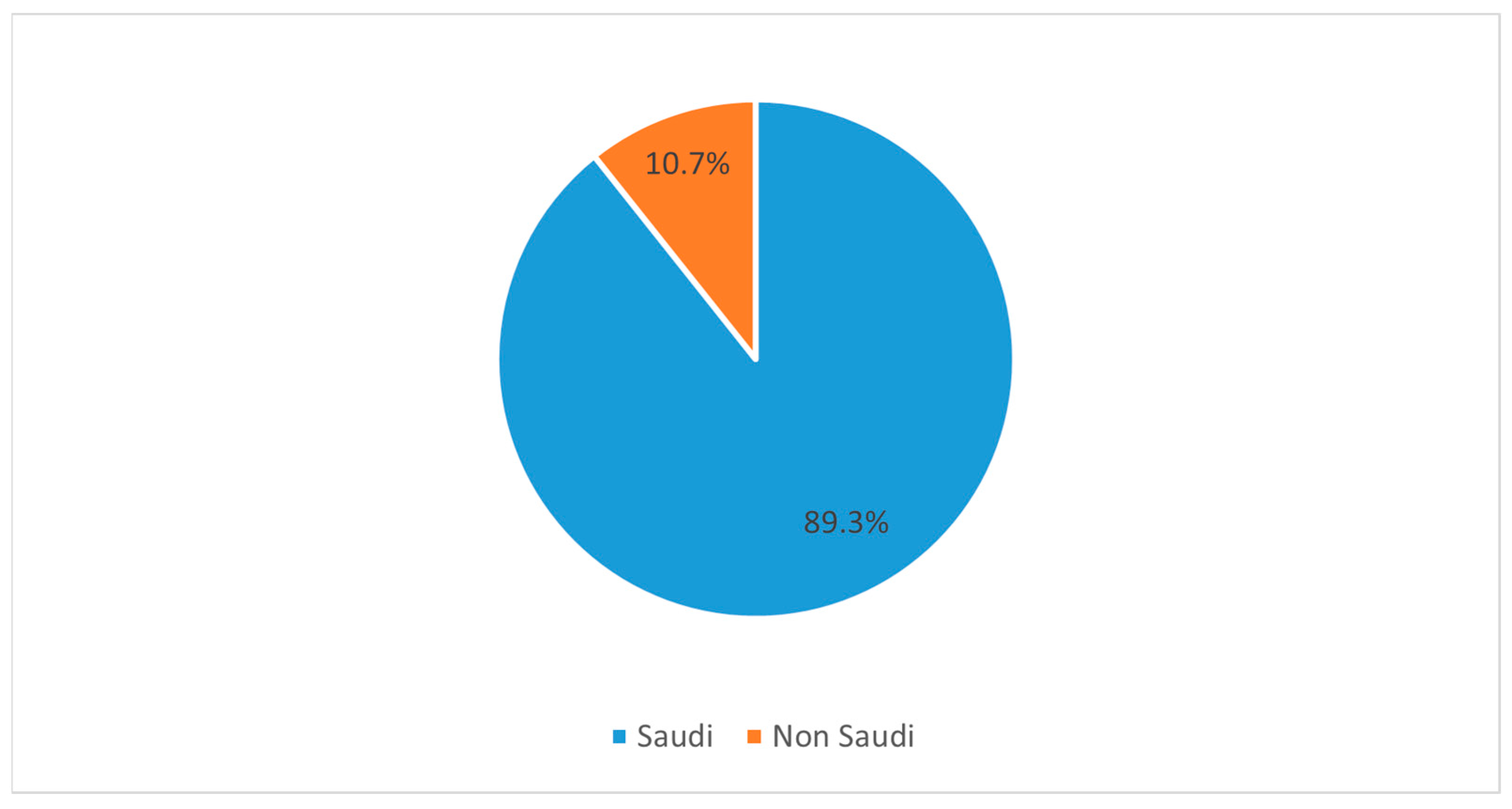

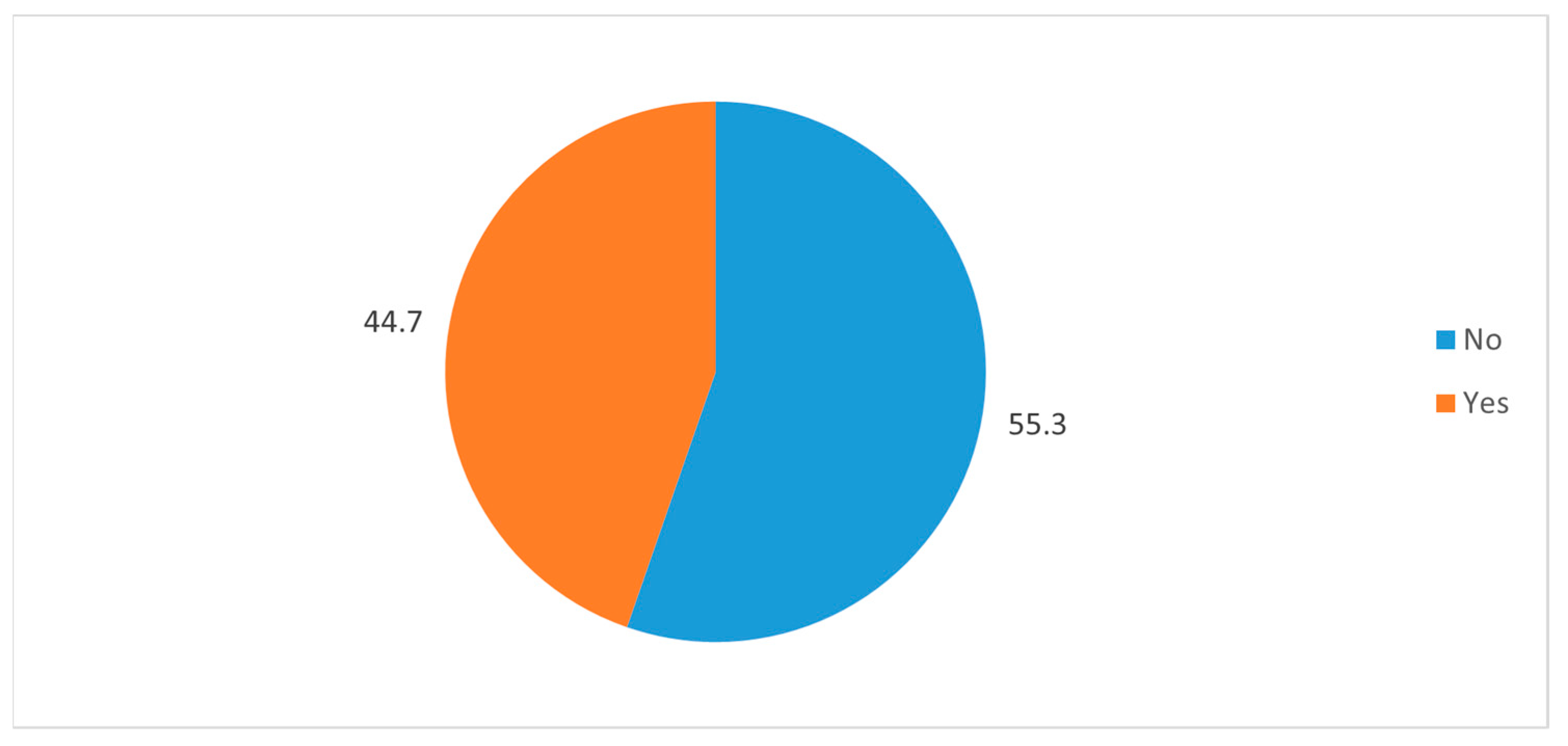
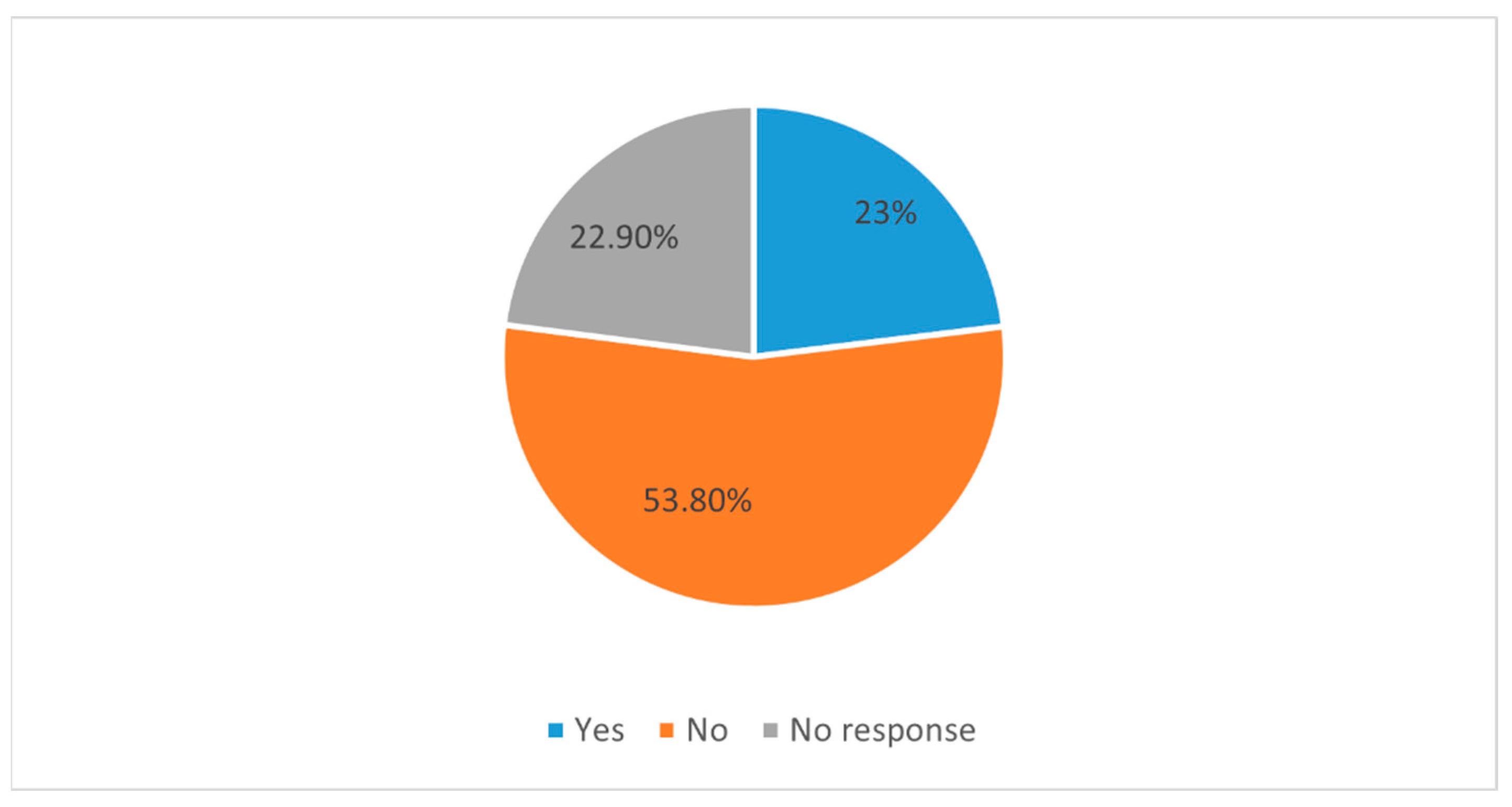
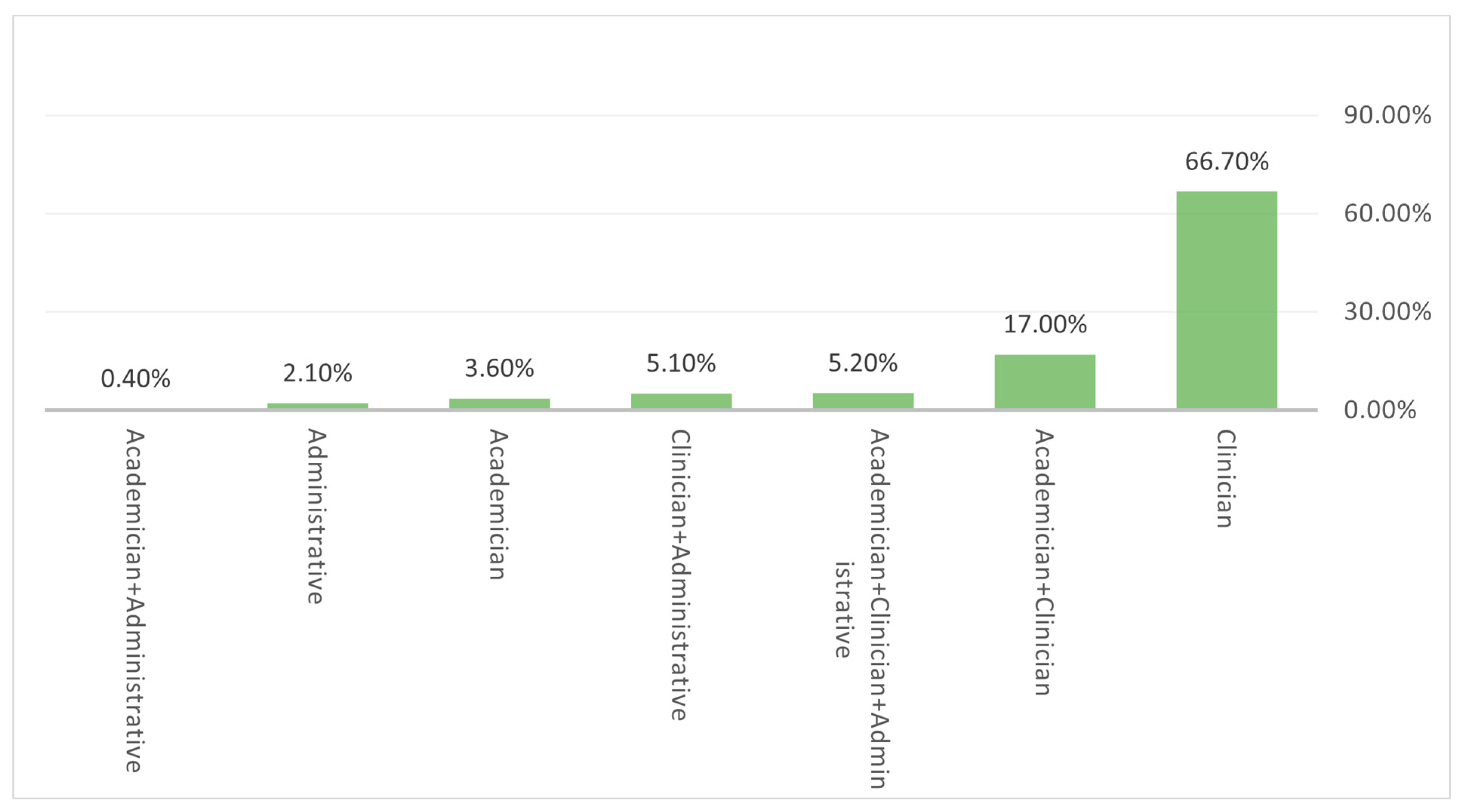


| Demographic Factors | |||||
|---|---|---|---|---|---|
| 1-Gender: | Male: | Female: | |||
| 2-Nationality: | Saudi | Non-Saudi | |||
| 3-Year of study: | Year 4 | Year 5 | Year 6 | Interns | |
| 4-If you are an intern, have you completed your emergency department rotation? | Yes: | No: | |||
| 5-Would you be interested in taking an elective rotation in neurosurgery to get more exposure to the neurosurgery specialty? | Yes: | No: | |||
| Have you been involved directly in management of acute neurosurgical patients? | Yes: | No: | |||
| Have you been involved directly in management of elective neurosurgical patients? | Yes: | No: | |||
| Have you been in operation room for acute neurosurgical procedure? | Yes: | No: | |||
| Have you been in operation room for elective neurosurgical procedure? | Yes: | No: | |||
| 6-What kind of role do you see for yourself in your future career? | Academician | Clinician | Administrative | ||
| 7-As per your observation, what proportion of your classmates/college friends whom you know well have made up their minds regarding their specialization choices? | Around half | Not sure | Most of them | Few of them | Less than half |
| Past experience and interest in specialty, Stereotypes and personal factors | Strongly agree | Agree | Disagree | Strongly disagree | Not sure |
| 1-Neurosurgery is an important subject | |||||
| 2-Neurosurgery is/was taught as part of my undergraduate medical degree | |||||
| 3-Neurosurgery should be taught as part of an undergraduate medical degree | |||||
| 4-Neurosurgery rotation should be a compulsory rotation in internship | |||||
| 5-Neurosurgery is an interesting specialty | |||||
| 6-Neurosurgery is a dying specialty | |||||
| 7-Neurosurgeons are well paid | |||||
| 8-Neurosurgeons are intelligent | |||||
| 9-Neurosurgeons need to be emotionally detached from their patients | |||||
| 10-Neurosurgery is a depressing specialty | |||||
| 11-Neurosurgical treatment does not cure the patients most of the times | |||||
| 12-Neurosurgery training programs are the most competitive to get into | |||||
| 13-Neurosurgery is a male specialty | |||||
| 14-Neurosurgeons need excellent manual dexterity | |||||
| 15-Neurosurgery is more about technical skill than academic knowledge | |||||
| 16-I would consider a career in neurosurgery | |||||
| 17-Neurosurgical illnesses are challenging and interesting | |||||
| 18-Neurosurgery requires a long training period | |||||
| 19-Neurosurgery requires long operating hours | |||||
| 20-Huge prestige is attached to neurosurgery | |||||
| 21-Work as a neurosurgery specialist can impede family life | |||||
| 22-Future neurosurgical specialty job opportunities in Saudi Arabia are limited | |||||
| 23-Adventure loving persons are best suited to do neurosurgery specialization | |||||
| 24-College teachers/seniors have a great influence on any students’ specialization choice after MBBS | |||||
| Comparisons between Gender and Items | |||||
|---|---|---|---|---|---|
| Items | Gender | N | Mean | Std. Deviation | p-Value |
| I would consider a career in neurosurgery | Male | 518 | 2.85 | 1.391 | 0.374 |
| Female | 496 | 2.77 | 1.380 | ||
| Neurosurgery training programs are the most competitive to get into | Male | 518 | 3.40 | 1.143 | 0.004 |
| Female | 496 | 3.60 | 1.050 | ||
| Adventure-loving persons are best suited to do neurosurgery specialization | Male | 518 | 3.30 | 0.996 | 0.647 |
| Female | 496 | 3.33 | 0.905 | ||
| College teachers/seniors have a great influence on any students’ specialization choice after MBBS | Male | 518 | 3.73 | 1.036 | 0.758 |
| Female | 496 | 3.75 | 1.054 | ||
| If you are an MBBS student, have you completed your undergraduate (i.e., MBBS program) neurosurgery rotation? | Male | 393 | 1.70 | 0.457 | 0.852 |
| Female | 385 | 1.70 | 0.459 | ||
| Future neurosurgical specialty job opportunities in Saudi Arabia are limited | Male | 518 | 3.26 | 1.025 | 0.290 |
| Female | 496 | 3.32 | 0.952 | ||
| Huge prestige is attached to neurosurgery | Male | 518 | 3.99 | 0.920 | 0.894 |
| Female | 496 | 4.00 | 0.888 | ||
| If you are an intern, have you completed your emergency department rotation? | Male | 307 | 1.78 | 0.416 | 0.003 |
| Female | 288 | 1.67 | 0.471 | ||
| Neurosurgeons are intelligent | Male | 518 | 3.79 | 0.918 | 0.000 |
| Female | 496 | 4.09 | 0.880 | ||
| Neurosurgeons are well paid | Male | 518 | 3.69 | 1.019 | 0.670 |
| Female | 496 | 3.72 | 0.961 | ||
| Neurosurgeons need excellent manual dexterity | Male | 518 | 4.10 | 0.900 | 0.124 |
| Female | 496 | 4.18 | 0.855 | ||
| Neurosurgeons need to be emotionally detached from their patients | Male | 518 | 3.11 | 1.210 | 0.274 |
| Female | 496 | 3.03 | 1.166 | ||
| Neurosurgery is a depressing specialty | Male | 518 | 3.34 | 1.118 | 0.003 |
| Female | 496 | 3.13 | 1.070 | ||
| Neurosurgery is a dying specialty | Male | 518 | 2.97 | 1.194 | 0.084 |
| Female | 496 | 2.89 | 1.105 | ||
| Neurosurgery is a male specialty | Male | 518 | 2.95 | 1.291 | 0.000 |
| Female | 496 | 1.89 | 1.122 | ||
| Neurosurgery is an important subject | Male | 518 | 4.51 | 0.748 | 0.030 |
| Female | 496 | 4.60 | 0.668 | ||
| Neurosurgery is an interesting specialty | Male | 518 | 3.84 | 1.112 | 0.000 |
| Female | 496 | 4.10 | 0.986 | ||
| Neurosurgery is more about technical skill than academic knowledge | Male | 518 | 3.16 | 1.230 | 0.663 |
| Female | 496 | 3.13 | 1.189 | ||
| Neurosurgery is/was taught as part of my undergraduate medical degree | Male | 518 | 3.62 | 1.093 | 0.301 |
| Female | 496 | 3.69 | 1.061 | ||
| Neurosurgery requires a long training period | Male | 518 | 4.28 | 0.756 | 0.103 |
| Female | 496 | 4.36 | 0.750 | ||
| Neurosurgery requires long operating hours | Male | 518 | 4.23 | 0.747 | 0.019 |
| Female | 496 | 4.33 | 0.725 | ||
| Neurosurgery rotation should be a compulsory rotation in internship | Male | 518 | 2.91 | 1.319 | 0.014 |
| Female | 496 | 3.11 | 1.266 | ||
| Neurosurgery should be taught as part of an undergraduate medical degree | Male | 518 | 3.84 | 1.092 | 0.296 |
| Female | 496 | 3.91 | 1.017 | ||
| Neurosurgical illnesses are challenging and interesting | Male | 518 | 3.96 | 0.908 | 0.000 |
| Female | 496 | 4.18 | 0.796 | ||
| Neurosurgical treatment does not cure the patients most of the times | Male | 518 | 3.16 | 1.131 | 0.159 |
| Female | 496 | 3.06 | 1.026 | ||
| Working as a neurosurgery specialist can impede family life | Male | 518 | 3.87 | 0.877 | 0.000 |
| Female | 496 | 3.65 | 0.871 | ||
| Would you be interested in taking an elective rotation in neurosurgery to get more exposure to the neurosurgery specialty? | Male | 518 | 1.59 | 0.493 | 0.020 |
| Female | 496 | 1.52 | 0.500 | ||
| Comparisons between Items and Students Groups (Interns and Medical Students) | |||||
|---|---|---|---|---|---|
| Items | Year of Study | Frequency | Mean | Std. Deviation | p-Values |
| I would consider a career in neurosurgery | Students | 630 | 2.99 | 1.379 | 0.000 |
| Interns | 384 | 2.51 | 1.344 | ||
| Neurosurgery training programs are the most competitive to get into | Students | 630 | 3.53 | 1.094 | 0.247 |
| Interns | 384 | 3.44 | 1.116 | ||
| Adventure-loving persons are best suited to do neurosurgery specialization | Students | 630 | 3.35 | 0.950 | 0.076 |
| Interns | 384 | 3.24 | 0.952 | ||
| College teachers/seniors have a great influence on any students’ specialization choice after MBBS | Students | 630 | 3.77 | 1.004 | 0.149 |
| Interns | 384 | 3.68 | 1.105 | ||
| If you are an MBBS student, have you completed your undergraduate (i.e., MBBS program) neurosurgery rotation? | Students | 547 | 1.78 | 0.418 | 0.000 |
| Interns | 231 | 1.53 | 0.500 | ||
| Future neurosurgical specialty job opportunities in Saudi Arabia are limited | Students | 630 | 3.24 | 0.967 | 0.049 |
| Interns | 384 | 3.36 | 1.023 | ||
| Huge prestige is attached to neurosurgery | Students | 630 | 3.99 | 0.900 | 0.945 |
| Interns | 384 | 3.99 | 0.911 | ||
| If you are an intern have you completed your emergency department rotation? | Students | 220 | 1.87 | 0.334 | 0.000 |
| Interns | 375 | 1.64 | 0.481 | ||
| Neurosurgeons are intelligent | Students | 630 | 4.01 | 0.865 | 0.001 |
| Interns | 384 | 3.81 | 0.971 | ||
| Neurosurgeons are well paid | Students | 630 | 3.71 | 1.000 | 0.618 |
| Interns | 384 | 3.68 | 0.977 | ||
| Neurosurgeons need excellent manual dexterity | Students | 630 | 4.19 | 0.853 | 0.027 |
| Interns | 384 | 4.06 | 0.916 | ||
| Neurosurgeons need to be emotionally detached from their patients | Students | 630 | 3.03 | 1.168 | 0.151 |
| Interns | 384 | 3.14 | 1.220 | ||
| Neurosurgery is a depressing specialty | Students | 630 | 3.20 | 1.096 | 0.139 |
| Interns | 384 | 3.30 | 1.102 | ||
| Neurosurgery is a dying specialty | Students | 630 | 2.93 | 1.149 | 0.916 |
| Interns | 384 | 2.93 | 1.158 | ||
| Neurosurgery is a male specialty | Students | 630 | 2.40 | 1.350 | 0.301 |
| Interns | 384 | 2.49 | 1.270 | ||
| Neurosurgery is an important subject | Students | 630 | 4.57 | 0.700 | 0.221 |
| Interns | 384 | 4.52 | 0.730 | ||
| Neurosurgery is an interesting specialty | Students | 630 | 4.04 | 1.047 | 0.005 |
| Interns | 384 | 3.85 | 1.071 | ||
| Neurosurgery is more about technical skill than academic knowledge | Students | 630 | 3.17 | 1.202 | 0.452 |
| Interns | 384 | 3.11 | 1.224 | ||
| Neurosurgery is/was taught as part of my undergraduate medical degree | Students | 630 | 3.61 | 1.094 | 0.100 |
| Interns | 384 | 3.73 | 1.047 | ||
| Neurosurgery requires a long training period | Students | 630 | 4.35 | 0.740 | 0.158 |
| Interns | 384 | 4.28 | 0.774 | ||
| Neurosurgery requires long operating hours | Students | 630 | 4.26 | 0.739 | 0.300 |
| Interns | 384 | 4.31 | 0.737 | ||
| Neurosurgery rotation should be a compulsory rotation in internship | Students | 630 | 3.25 | 1.266 | 0.000 |
| Interns | 384 | 2.61 | 1.249 | ||
| Neurosurgery should be taught as part of an undergraduate medical degree | Students | 630 | 3.91 | 1.059 | 0.182 |
| Interns | 384 | 3.82 | 1.050 | ||
| Neurosurgical illnesses are challenging and interesting | Students | 630 | 4.10 | 0.835 | 0.119 |
| Interns | 384 | 4.01 | 0.901 | ||
| Neurosurgical treatment does not cure the patients most of the times | Students | 630 | 3.12 | 1.037 | 0.774 |
| Interns | 384 | 3.10 | 1.152 | ||
| Working as a neurosurgery specialist can impede family life | Students | 630 | 3.76 | 0.863 | 0.754 |
| Interns | 384 | 3.77 | 0.910 | ||
| Would you be interested in taking an elective rotation in neurosurgery to get more exposure to the neurosurgery specialty? | Students | 630 | 1.47 | 0.499 | 0.000 |
| Interns | 384 | 1.70 | 0.460 | ||
| Gender Wise Comparison (Male and Female) Views with Items (Strongly Agree and Agree Combined) | |
|---|---|
| I Would Consider a Career in Neurosurgery | |
| Male | 36.9% |
| Female | 33.1% |
| Neurosurgery training programs are the most competitive to get into | |
| Male | 49.4% |
| Female | 55.5% |
| Adventure-loving persons are best suited to do neurosurgery specialization | |
| Male | 40.5% |
| Female | 37.9% |
| College teachers/seniors have a great influence on any students’ specialization choice after MBBS | |
| Male | 64.9% |
| Female | 65.3% |
| Huge prestige is attached to neurosurgery | |
| Male | 70.5% |
| Female | 72.4% |
| Neurosurgeons are intelligent | |
| Male | 67.4% |
| Female | 76.6% |
| Neurosurgeons are well paid | |
| Male | 55.6% |
| Female | 55.2% |
| Neurosurgeons need excellent manual dexterity | |
| Male | 79.7% |
| Female | 83.9% |
| Neurosurgeons need to be emotionally detached from their patients | |
| Male | 40.0% |
| Female | 36.3% |
| Neurosurgery is a depressing specialty | |
| Male | 43.6% |
| Female | 37.7% |
| Neurosurgery is a dying specialty | |
| Male | 32.2% |
| Female | 28.4% |
| Neurosurgery is a male specialty | |
| Male | 36.5% |
| Female | 12.5% |
| Neurosurgery is an important subject | |
| Male | 94.2% |
| Female | 96.0% |
| Neurosurgery is an interesting specialty | |
| Male | 72.0% |
| Female | 82.7% |
| Neurosurgery is more about technical skill than academic knowledge | |
| Male | 44.4% |
| Female | 40.7% |
| Neurosurgery is/was taught as part of my undergraduate medical degree | |
| Male | 59.3% |
| Female | 59.1% |
| Neurosurgery requires a long training period | |
| Male | 87.6% |
| Female | 89.1% |
| Neurosurgery requires long operating hours | |
| Male | 84.7% |
| Female | 88.1% |
| Neurosurgery rotation should be a compulsory rotation in internship | |
| Male | 35.5% |
| Female | 40.1% |
| Neurosurgery should be taught as part of an undergraduate medical degree | |
| Male | 70.7% |
| Female | 70.6% |
| Neurosurgical illnesses are challenging and interesting | |
| Male | 79.2% |
| Female | 87.1% |
| Neurosurgical treatment does not cure the patients most of the times | |
| Male | 39.2% |
| Female | 34.9% |
| Working as a neurosurgery specialist can impede family life | |
| Male | 65.3% |
| Female | 57.5% |
Publisher’s Note: MDPI stays neutral with regard to jurisdictional claims in published maps and institutional affiliations. |
© 2022 by the authors. Licensee MDPI, Basel, Switzerland. This article is an open access article distributed under the terms and conditions of the Creative Commons Attribution (CC BY) license (https://creativecommons.org/licenses/by/4.0/).
Share and Cite
Alnaami, I.; Ahmad, M.T.; Khan, M.A.; Amer, K.A.; Alsaedan, A.; Alanazi, A.; Alkhonizy, S.; Alamri, A. Perceptions of Neurosurgery among Medical Students and Interns: A National Cross-Sectional Study. Medicina 2022, 58, 1120. https://doi.org/10.3390/medicina58081120
Alnaami I, Ahmad MT, Khan MA, Amer KA, Alsaedan A, Alanazi A, Alkhonizy S, Alamri A. Perceptions of Neurosurgery among Medical Students and Interns: A National Cross-Sectional Study. Medicina. 2022; 58(8):1120. https://doi.org/10.3390/medicina58081120
Chicago/Turabian StyleAlnaami, Ibrahim, Mohammad Tauheed Ahmad, Mohammed Abid Khan, Khaled A. Amer, Abdullah Alsaedan, Abdulaziz Alanazi, Sarah Alkhonizy, and Abdulaziz Alamri. 2022. "Perceptions of Neurosurgery among Medical Students and Interns: A National Cross-Sectional Study" Medicina 58, no. 8: 1120. https://doi.org/10.3390/medicina58081120
APA StyleAlnaami, I., Ahmad, M. T., Khan, M. A., Amer, K. A., Alsaedan, A., Alanazi, A., Alkhonizy, S., & Alamri, A. (2022). Perceptions of Neurosurgery among Medical Students and Interns: A National Cross-Sectional Study. Medicina, 58(8), 1120. https://doi.org/10.3390/medicina58081120






